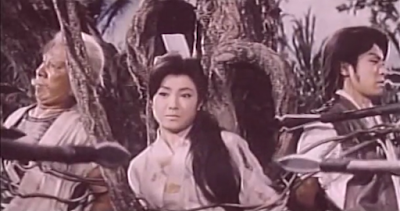The director Tadashi Sawashima, who died last January at age 91, specialized in samurai and yakuza films. I suppose a pirate film would occupy a middle ground between those two categories, depending on whom the English title refers to. Depending on what you read -- I recommend an essay by the scholar Bernard Scheid in the anthology The Sea and the Sacred in Japan -- "Kaizoku Bahansen" is something of a redundancy, since both words have been translated as "pirate." Kaizoku seems to be the more unambiguous word, while bahansen, in the film's historical context, has more to do with illicit trade. During the mid 16th century CE, Japan's Sengoku or civil war period, China forbade maritime trade, but Chinese traders maintained clandestine relations with their Japanese counterparts. The argument of Sawashima's film is that the bahansen in general were peaceful traders, but acquired a bad name because a few bad apples raided and plundered coastal China, Korea, and other places. Thus, in the film, Kamon (Hashizo Okawa) is initially outraged to discover that, though raised a merchant's son, he's actually the son of a renowned bahansen. He discovers this when his natural father's old cronies press him, for all intents and purposes, into the service, though a younger leader (Eiji Okada) wants nothing to do with the landlubber. Kamon begins to change his mind when he's told that his father and mother were murdered by outright pirate Uemondayu, who's been ravaging the seas under the bahansen banner. Having some pretty girls with the fleet also helps win him over to the cause. Fortunately, he proves a natural with some innate cunning, winning a mast-climbing contest by distracting his competitor with the sight of one of those women. With his sea cred thus established it's on to high adventure on the high seas.
Toei spent some money on this film, which deploys several full-scale ships on open water, though they resort to more predictable model work on occasion and many night scenes on board are understandably shot on soundstage interiors. All in all, there's less of a ship-in-a-bottle feel here than in contemporary pirate programmers from the U.S. Sawashima directs energetically, cross cutting and moving his camera closer and closer to the principals to build up momentum for the film's sea battles and keeping his climactic shipboard fight moving at an urgent clip. If anything, his direction is most frantic and over the top in the scenes where the good bahansens return to and depart from their home port. The home folks go nuts for their seafaring heroes, their enthusiasm illustrated by insistently repetitive shots of celebration, from sailors throwing themselves into the water to meet welcoming rowboats to shots of cheering females. The director's galloping camera gives these festive scenes more of an epic feel than anything else in the picture.
In the end it's a simple story of good and evil, but its goodness of purpose is marred by a trip to a primitive island previously ravaged by Uemondayu, populated by badly blackfaced Japanese extras who give the good guys exactly the treatment you might expect from the most racist American movie, short of throwing our heroes into the proverbial stewpot. If you took offense at the Faro Island scenes from King Kong vs. Godzilla, you'd better steer clear of this picture. But if you think you can stomach some unenlightened moments, you'll find Kaizoku Bahansen a pleasant enough adventure film that gets more entertaining as it goes along.





No comments:
Post a Comment